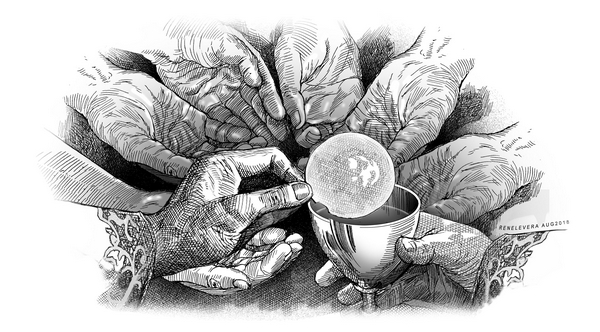
At breakfast this morning, “Litany,” a poem by Billy Collins, flashed into my mind. Collins begins with these lines by the Belgian poet Jacques Crickillon:
You are the bread and the knife,
The crystal goblet and the wine.
In his usual, humorous manner, Collins continues these lines with a series of declarations as to what the reader is–the dew on the morning grass, the burning wheel of the sun, the white apron of the baker, the marsh birds suddenly in flight.
The next stanza shifts gears with “however,” and presents a list of what the reader is not–the wind in the orchard, the plums on the counter, the house of cards, the pine-scented air, but — in the succeeding stanza — concedes that the reader could be the fish under the bridge or the pigeon on the general’s head, but not the field of cornflowers at dusk.
And then the poem, introducing the segment with “[i]t might interest you to know,” starts saying what the speaker himself is–the sound of rain on the roof, the shooting star, the evening paper blowing down an alley, the basket of chestnuts on the kitchen table, the moon in the trees, and the blind woman’s tea cup.
The poem ends with words of pseudo-consolation – “But don’t worry, I’m not the bread and the knife. /You are still the bread and the knife. / You will always be the bread and the knife, / not to mention the crystal goblet and – somehow – the wine.”
I haven’t read the poem by Crickillon, who has, poor fellow, come up to the surface of our consciousness by way of Collins. When he wrote — “You are the bread and the knife / The crystal goblet and the wine” — he must have meant that the person addressed was to him a source of nourishment, a source of strength.
In the Gospel of John, Jesus said, “I am the living bread that came down from heaven; whoever eats this bread will live forever; and the bread that I will give is my flesh for the life of the world.”
In these words is an immediacy not found in Crickillon’s, or Collins’ lines, a clarity of meaning that troubled the Jews, who asked each other, “How can this man give us his flesh to eat?”
Jesus’ words do not cut me some slack. He seems to mean them as they are: “For my flesh is true food, and my blood is true drink. Whoever eats my flesh and drinks my blood remains in me and I in him.”
As a believer, I take the words of Jesus at face value. He is the bread of life. His flesh is true food; his blood, true drink. At the Last Supper, he turned the bread into his flesh, and the wine into his blood, and this, through the priest, he continues to do at the Holy Mass, where during Holy Communion I receive him as food, true food.
St. Augustine wrote that “[t]his bread… requires the hunger of the inner man” and that “he that hungers after this bread, hungers after righteousness…”
Others can be all the things that Billy Collins lists in his “Litany.” Myself, I’ll have the bread and wine.
Disclaimer: The comments uploaded on this site do not necessarily represent or reflect the views of management and owner of Cebudailynews. We reserve the right to exclude comments that we deem to be inconsistent with our editorial standards.




